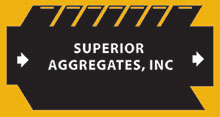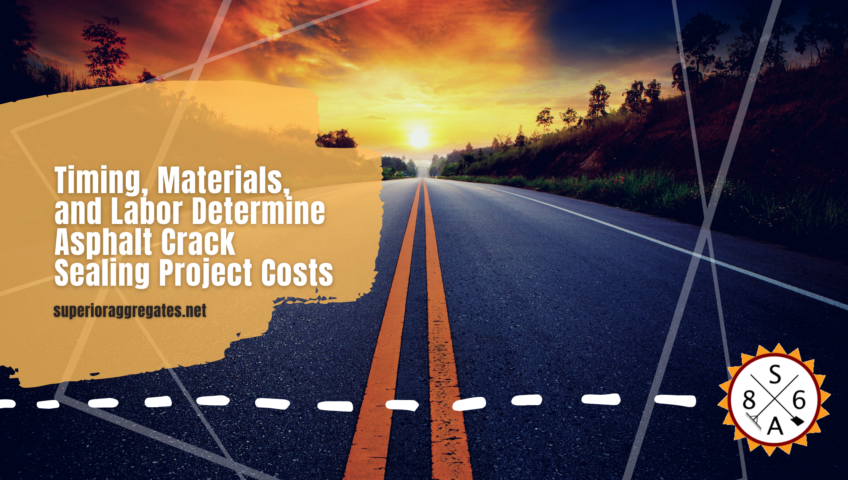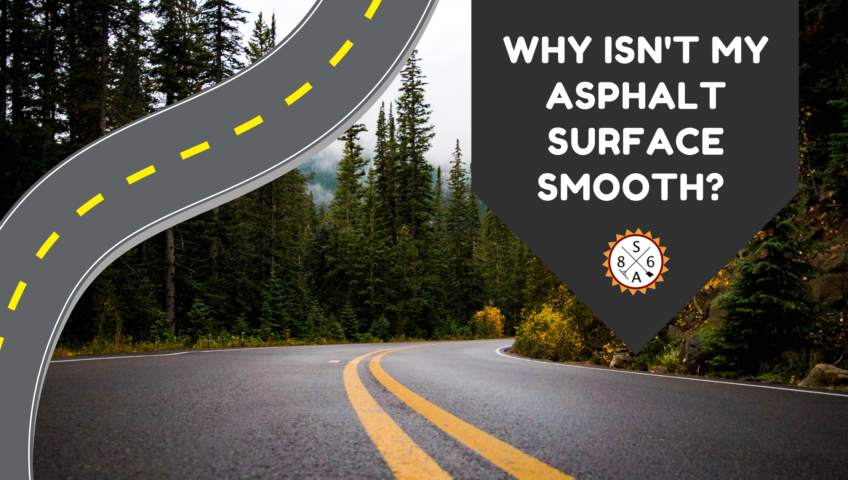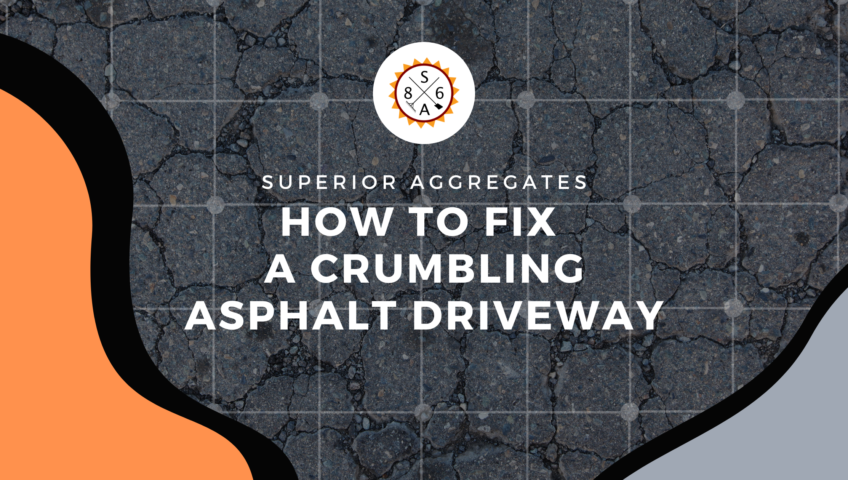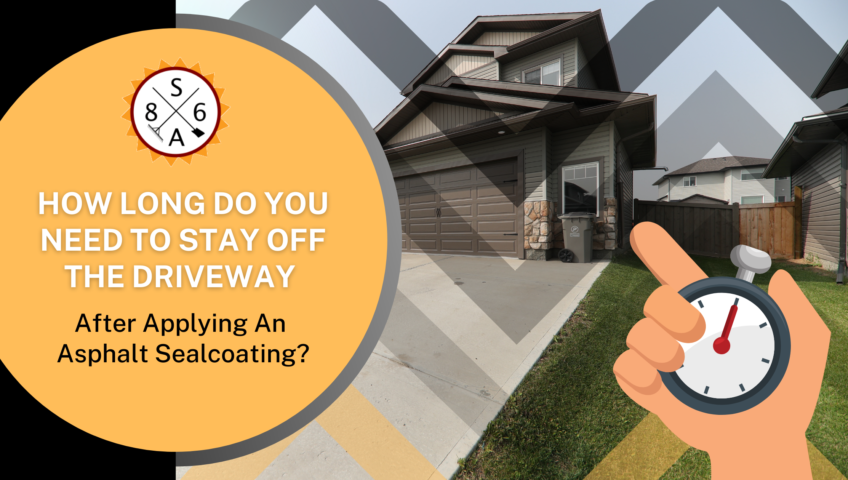
How Long Do You Need to Stay Off The Driveway After Applying An Asphalt Sealcoating?
One of the primary questions residential and commercial property owners want to know about applying a driveway sealcoat involves drying times. More specifically, property owners want to know how long after an asphalt sealcoat has been laid down can they resume usage.
While some resources offer advice such as “48 hours,” the answer is not that simple. A wide range of products can be employed, and each type of asphalt sealcoat dry time differs. It’s also important to keep in mind that seasonal temperatures and weather can impact how long you’ll need to stay off the driveway after applying a driveway sealcoat. For a more precise estimate, these are things property owners would be well-served to consider.
How Will Rain Effect an Asphalt Sealcoat?
Experienced asphalt contractors are careful to check local weather reports. Should Mother Nature deliver unexpected precipitation, an asphalt sealcoat can be rendered uneven or non-existent. Moisture from automatic sprinklers and other delivery systems can have the same negative effect on a newly coated surface. A driveway sealcoat typically must dry for at least 4-8 hours, depending on the product and conditions. Given the impact water can have on sealants, it’s advisable to stay off the driveway until a contractor can rectify the issue.
How Long Does A Driveway Sealcoat Take To Dry During Summer?
The best time to apply an asphalt sealcoat is during the warm-weather months. This timing should also be factored against regional rainy seasons. Some areas of the country experience fast-moving showers and severe weather during periods of high temperatures. That’s why local driveway sealcoat contractors pay special attention during those months.
That being said, it’s typically wise to take advantage of warm weather days with full sunlight. A sealcoat can dry within a few hours when applied in direct sunlight on a warm day. Depending on the product, property owners may be able to walk on their driveway as soon as 4 hours after the process has been completed. In terms of driving an automobile on the newly coated surface, the soonest advisable usage is about 24 hours. Most surfaces require a minimum of 48 hours before vehicles can drive over them without negatively impacting the work. However, if weather conditions are not optimal, it may be in your best interest to stay off the driveway for at least 72 hours.
When Can a Driveway Sealcoat Handle Everyday Use?
It’s essential for property owners to understand that a significant difference exists between walking, driving, and unfettered use. While a fast-drying asphalt sealcoat product can hasten light usage, most materials take much longer to fully cure. It’s not unusual for driveways to require upwards of 30 days before property owners enjoy carefree usage. That’s largely because asphalt sealcoat products may not have hardened enough to withstand oil and fuel staining. A product that has not necessarily completely cured could be negatively impacted by turning car or truck tires in place or hard impacts. The critical point is that home and business owners would be wise to take precautions during the first month to ensure the surface isn’t compromised.
Driveway Sealcoat Best Practices Make A Difference
For an asphalt sealcoat to effectively dry and cure, best practices must be observed. Temperatures should not generally fall below 50 degrees and driveways must be perfectly dry before applying products. Sunny days with low humidity maximize dry times and support effective curing. Never consider applying a driveway sealcoat if the forecast indicates a rain threat within 8-12 hours. If severe weather has been forecast, it may be prudent to postpone the work. Asphalt sealcoat best practices help shorten the time your driveway will be sidelined.
One of the primary questions residential and commercial property owners want to know about applying a driveway sealcoat involves drying times. More specifically, property owners want to know how long after an asphalt sealcoat has been laid down can they resume usage.
While some resources offer advice such as “48 hours,” the answer is not that simple. A wide range of products can be employed, and each type of asphalt sealcoat dry time differs. It’s also important to keep in mind that seasonal temperatures and weather can impact how long you’ll need to stay off the driveway after applying a driveway sealcoat. For a more precise estimate, these are things property owners would be well-served to consider.
How Will Rain Effect an Asphalt Sealcoat?
Experienced asphalt contractors are careful to check local weather reports. Should Mother Nature deliver unexpected precipitation, an asphalt sealcoat can be rendered uneven or non-existent. Moisture from automatic sprinklers and other delivery systems can have the same negative effect on a newly coated surface. A driveway sealcoat typically must dry for at least 4-8 hours, depending on the product and conditions. Given the impact water can have on sealants, it’s advisable to stay off the driveway until a contractor can rectify the issue.
How Long Does A Driveway Sealcoat Take To Dry During Summer?
The best time to apply an asphalt sealcoat is during the warm-weather months. This timing should also be factored against regional rainy seasons. Some areas of the country experience fast-moving showers and severe weather during periods of high temperatures. That’s why local driveway sealcoat contractors pay special attention during those months.
That being said, it’s typically wise to take advantage of warm weather days with full sunlight. A sealcoat can dry within a few hours when applied in direct sunlight on a warm day. Depending on the product, property owners may be able to walk on their driveway as soon as 4 hours after the process has been completed. In terms of driving an automobile on the newly coated surface, the soonest advisable usage is about 24 hours. Most surfaces require a minimum of 48 hours before vehicles can drive over them without negatively impacting the work. However, if weather conditions are not optimal, it may be in your best interest to stay off the driveway for at least 72 hours.
When Can a Driveway Sealcoat Handle Everyday Use?
It’s essential for property owners to understand that a significant difference exists between walking, driving, and unfettered use. While a fast-drying asphalt sealcoat product can hasten light usage, most materials take much longer to fully cure. It’s not unusual for driveways to require upwards of 30 days before property owners enjoy carefree usage. That’s largely because asphalt sealcoat products may not have hardened enough to withstand oil and fuel staining. A product that has not necessarily completely cured could be negatively impacted by turning car or truck tires in place or hard impacts. The critical point is that home and business owners would be wise to take precautions during the first month to ensure the surface isn’t compromised.
Driveway Sealcoat Best Practices Make A Difference
For an asphalt sealcoat to effectively dry and cure, best practices must be observed. Temperatures should not generally fall below 50 degrees and driveways must be perfectly dry before applying products. Sunny days with low humidity maximize dry times and support effective curing. Never consider applying a driveway sealcoat if the forecast indicates a rain threat within 8-12 hours. If severe weather has been forecast, it may be prudent to postpone the work. Asphalt sealcoat best practices help shorten the time your driveway will be sidelined.
